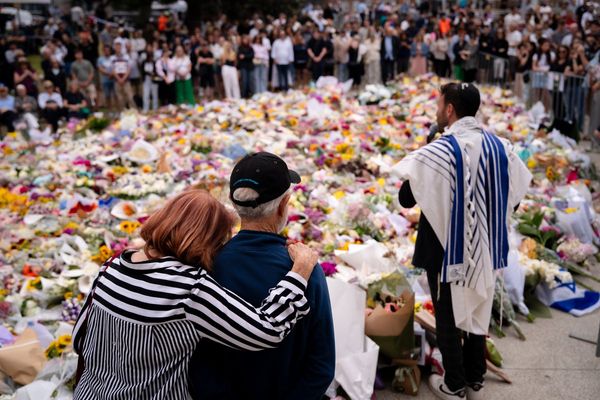
The publication of Liz Cheney’s book, Oath and Honor, is bringing plaudits, once again, for her courage in calling out Donald Trump’s efforts to overturn the constitution. From this historian, it brings a different kind of gratitude. Not only for her patriotism, which has already come at a cost, but for how she allowed the slow work of history to inform a fast-moving political situation that was rapidly becoming a crisis.
In this case, the history was a little-known story about the vexed election of Abraham Lincoln, embedded in a book I wrote in 2020, Lincoln on the Verge: Thirteen Days to Washington. The book came out with almost laughably bad timing: in April 2020, just after Covid hit. Printing plants struggled to get the book to stores, stores struggled to stay open, all talks were canceled. After nearly a decade of research, it seemed like the book would go straight to the remainder bin. But as it turned out, people still read it, including members of Congress.
Lincoln’s presidency is, of course, well known. It is difficult to imagine a world in which he is not looking over us from the Lincoln Memorial. But as I researched the presidential transition of 1860-61, I was surprised to discover just how much resistance he faced. He nearly didn’t make it to Washington at all.
Then, as now, a significant subpopulation refused to accept the result of an election. We all grew up learning about the result: the civil war, which killed 750,000. In the weeks before Lincoln’s arrival, armed militias menaced Congress and there were rumors of a violent takeover of the Capitol, to prevent his inauguration. Seven states seceded before he arrived. Four would secede after.
Passions came to a head on 13 February 1861, when Congress assembled to tally electoral certificates. Lincoln had clearly won, with 180 votes. The closest runner-up was the candidate of the south, John C Breckinridge, with 72. Amazingly, the certificates, carried in a wooden box, were sent to Breckinridge, who as the outgoing vice-president was also president of the Senate. If the certificates were miscounted, he would stand to benefit. Then Congress might interfere, as it did in 1824, when it denied the winner of the popular vote, Andrew Jackson, in the so-called “Corrupt Bargain” that put John Quincy Adams in power.
To his eternal credit, Breckinridge counted honestly and Lincoln was confirmed. Another southerner, Gen Winfield Scott, posted soldiers around the Capitol and kept an anti-Lincoln mob from entering the House. Breckinridge would become a high-ranking Confederate but he helped to make Lincoln’s presidency possible.
Strangely, these footnotes from my research began to come back to life at the end of 2020, during another interregnum, as Americans awaited the arrival of Joe Biden. Once again, there were dark rumors of violence, and a plot centered around the counting of the electoral certificates, to be held on 6 January 2021. The parallels are not perfect. In 1861, the country was weakened because a lame-duck president, James Buchanan, checked out. In 2021, an enraged president directed traffic. But still, I felt a sense of deja vu that fall.
We all know the rest of the story. On the day of the count, Trump summoned a mob to disrupt the vote. They were more successful than in 1861, with results we are still dealing with. But they failed, thanks to bravery of the Capitol police and the members of Congress, including Cheney, who stood their ground.

At the time, I wondered if anyone beside me was thinking about the eerie parallels to 1861. It turned out that Cheney was, for the simple reason that she was reading my book.
I learned about her interest in profiles written during the hearings staged by the January 6 committee. I heard similar stories about Jamie Raskin, the Maryland Democrat and committee member who mentioned my book in his 2022 book, Unthinkable. They may have passed it to each other. Just that image, of a Democrat and a Republican sharing a recommendation, is heartening.
In Cheney’s book, she describes reading my book in December 2020, remembering “chilling reading” as storm clouds gathered. Everything about her courage since January 6 would be familiar to the Americans of 1861 – northerners and southerners alike – who stood up for Lincoln. Many disapproved of him, or worried about rumors spread by his enemies. But they believed in democracy, and the constitution, and wanted to give him a chance. They were patriots in the old-fashioned sense.
It is a simple thing to agree with our allies. What is harder is to agree with our adversaries, or at least to let them speak their piece. Democracy depends on that respect.
When Lincoln finally arrived in Washington, after so many ordeals, he delivered a famous inaugural address, invoking our “better angels”. Since then, he has become something like the angel-in-chief, hovering over us, more present than most other ex-presidents. In 1963, he was looking over Martin Luther King Jr’s shoulder as he gave his “I Have a Dream” speech. In 1970, he gave some comfort to Richard Nixon when he wandered to the Lincoln Memorial to speak to anti-war protesters. To the rest of us, he can still appear unexpectedly, offering a form of communion. Or perhaps union is a better word, for a nation seeking desperately to find common ground.
In his oft-quoted poem, The Cure at Troy, Seamus Heaney wrote of a “longed-for tidal wave”, a rare convergence when “justice can rise up” and “hope and history rhyme”. History does not always rhyme, despite the quote often attributed, falsely, to Mark Twain. But now and then, the convergences are real. Liz Cheney found one, and acted on it. This historian is grateful for every reader, but especially for one who read a book so well.
Ted Widmer, distinguished lecturer at the Macaulay Honors College of the City University of New York, is the author of Lincoln on the Verge: Thirteen Days to Washington







